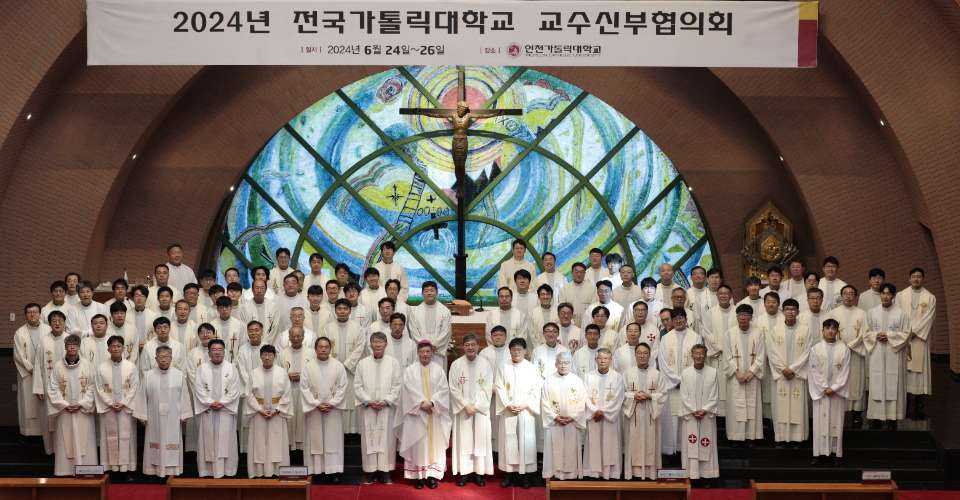
Bishops and priests pose for a photo following a Mass during the national symposium on priestly formation on June 25 at Incheon Catholic University, South Korea. (Photo: Incheon Catholic University)
The Korean Catholic Church needs to implement revised guidelines for effective priestly formation in all seminaries including establishing an emotional care system and a psychological evaluation model amid a decline in priestly vocation, Church leaders and theologians say.
The concerns were raised during a national symposium organized by the Catholic Bishops’ Conference Korea (CBCK) and the Catholic Theological Society of Korea.
The symposium at the Incheon Catholic University Theological College on June 24-25 drew bishops, priests, academics and theologians involved in seminary formation in various South Korean dioceses.
Participants contributed to revising the Korean Catholic Priest Training Guidelines formulated last year, and suggested the formation of a national council to oversee its implementation across seminaries.
“The most serious difficulties in priestly formation are the character and spiritual dimensions requested by the seminary and the priestly training of aspirants,” Father Exechiel Ki Jyong-man, a professor at Suwon Catholic University, said during the program.
“For this reason, it is important to establish a preliminary process through which a correct understanding and discernment of the identity and mission of a priest can be achieved, as well as the personal and spiritual preparation and growth of the aspirant,” he added.
“For implementation [of guidelines], a pan-diocese and pan-seminary consultative body is absolutely necessary,” he said.
The guidelines are the first of their kind the Korean Church has developed in consultation with input from priests and theologians of Catholic universities across the country.
Father Paul Jeon Yeong-joon, rector of the College of Theology at the Catholic University of Korea, highlighted the history and significance of the national guidelines for training Catholic priests.
“The work to revise the guidelines includes efforts to build trust by conforming to the teachings and norms of the universal Church,” he said.
“Through the revision work, I was able to feel that the Korean Church is deeply in harmony with not only individual churches but also the universal Church, and I think this has become a great legacy of faith,” he added.
Father Joseph Yu Sung-mo, a professor at Incheon Catholic University, highlighted the importance of including a mental health segment during seminary admissions and the formation process.
“The content on mental health introduced in the guidelines ensures that priestly formation is designed to produce qualitatively mature priests,” he said.
“If the social climate and family environment structure make it difficult for seminary applicants to achieve emotional maturity, seminaries will have to worry about providing emotional care,” he added.
Archbishop Peter Chung Soon-taick of Seoul, chairman of the Catholic bishops’ Commission for Clergy, said that current challenges require changes in the Korean Church.
“The answer to the question of how the Korean Church should change as it faces challenges such as a declining birth rate and young people’s external indifference toward religion will ultimately be changes in priests and visible movements in the Church,” Chung said.
“I hope that this will be an opportunity to think deeply about and discuss the direction in which priest training, that will lead change, should take place,” he added.
Korean bishops formed the 'Korean Priest Training Guidelines Revision Subcommittee' in 2017 following the publication of a new guidebook for training priests by the Vatican’s Congregation for Clergy in 2016.
The Vatican guidelines, “The Gift of the Priestly Vocation” recommended that countries prepare guidelines for training priests based on it.
The Korean Church’s own research found a decline in priestly vocation and the number of priests ordained every year.
In 2023, a total of 85 news priests were ordained compared to 131 in 2011, and seminary admissions dropped by 30 percent in 2021 compared to 2011, the study revealed.
An alarmingly low birth rate and secularization were cited among major factors behind the drop in priestly and religious vocation in the country.
* This report is brought to you in partnership with Catholic Times of Korea


